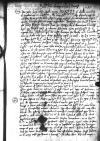Die XVI huius mensis Septembris recepi ⌊⌋ Reverendissimae Dominationis Tuae cum debita reverentia et singulari animi iucunditate. Ne vero Reverendissimae Dominationi Tuae longe altioribus negotiis occupatae, quam ut otiosa verba perlegat, prolixo responso sim molestus aut importunus, brevissime quantum res exigit respondebo. Transmisit sane Reverendissima Dominatio Tua exemplum litterarum illustrissimi principis ⌊ducis Saxoniae Georgii⌋ domini et patroni mei clementissimi. Quod ego ⌊Dresdam⌋ misi, pro ulteriore sollicitans, iuxta petitionem Reverendissimae Dominationis Tuae, responso illius. Hesterno igitur die iussu principis fui ⌊Dresdae⌋, ubi cancellarius eius dedit mihi hanc duarum epistolarum copiam, ut vocant. Ex quarum tenore intelleget Reverendissima Dominatio Tua non stare per ipsum principem, quominus voto et Reverendissimae Dominationis Tuae et ⌊populi Lubaviensis⌋ satisfiat. Stat autem tum per Universitatem tum per ⌊senatum Lipsensem⌋, qui et mihi (pace vestra dictum sit) aequas videntur adducere rationes. Quamvis enim de fide, pietate constantiaque Reverendissimae Dominationis Tuae nihil dubitem, tamen de successore tuo, qualis futurus sit, quis non dubitare queat? Arbitror autem te brevi successorem ibi habiturum non sane per obitum (quod minime gentium velim), sed per ulteriorem Reverendissimae Dominationis Tuae promotionem. Video enim haec piissimo ac invictissimo ⌊regi vestro⌋ sollemne atque consuetum, ut bene meritos episcopos semper ad meliores praelaturas evehat. Quid igitur, si successor aut ⌊senatus Lubaviensis⌋ scholares non ⌊Lipsiam⌋, sed alio mitteret, si domi haberet pecunias? An ignoramus, quam multi in Prussia non bene faveant nunc fidei catholicae? Ignoramus quidem certum numerum, sed vereor nimium esse multos tum in publico tum in privato, in manifesto et in occulto. Nolim igitur per Reverendissimam Dominationem Tuam dari vel occasionem vel facultatem, quae studio Lipsensi detrimentum pareret aut testamento Cuppeneriano laqueum fraudemve pararet. Quantum attinet ad scholarem Lubaviensem, quem scribit Reverendissima Dominatio Tua XII annos natum, libentissime profecto pietati tuae inservirem, si possem. Verum cum ⌊Lipsiae⌋ non habitem, sed ⌊Misnae⌋, quae a ⌊Lipsia⌋ X miliaribus distat, neque umquam ⌊Lipsiae⌋ studuerim neque collega fuerim, non possum hic ea praestare, quae petit a me Reverendissima Dominatio Tua. Scripsi autem ⌊patri⌋ affinis mei ⌊Matthiae⌋, qui Reverendissimae Dominationi Tuae famulatur, ut is det operam, si forte puer ille advenerit, ut adsit ei et consilio et auxilio propter Reverendissimam Dominationem Tuam. Scripsi et fratri famuli tui bibliopolae, ut mittat ad Reverendissimam Dominationem Tuam novos libros, si qui ex Francfordiensi mercatu advenerint. Ego adhuc nihil eorum vidi neque adhuc litteras ab illo, posteaquam e ⌊Francfordia⌋ iam reversus est, accepi. Id quod aegre fero, sperabam enim inde certiora allatum iri tum de bello ⌊caesaris⌋ et ⌊Galli⌋ tum de obitu singularis ac perpetui ⌊Germaniae⌋ ornamenti ⌊Erasmi Roterodami⌋, ut ea Reverendissimae Dominationi Tuae ac reverendissimo ⌊domino Plocensi⌋ significarem. Quantum autem accepi, tantum mitto. Et praeterea ternas uno die litteras eadem de re nuper ex ⌊Ingolstadio⌋, ex Eystet et ex ⌊Turingia⌋ acceperam, prius ut anxie verear, rem non esse omnino vanam. Quamvis in die Ascensionis hoc anno binas ad me ⌊Basilea⌋ litteras ipse dederit ⌊Erasmus⌋. Scripsi Frobenio[1], ut rem certius mihi significaret e ⌊Francfordia⌋, sed nullas adhuc litteras inde recepi.
Exulant apud vos ⌊Gedani⌋ incliti praesules ⌊archiepiscopus Upsalensis⌋, ⌊episcopus Linc[opensis]⌋ et episcopus Scarensis, viri procul dubio et honore et favore atque amore dignissi[mi], quorum exilio diuturno non leviter condoleo. Quod certe re ipsa potius quam verb[is] declaraturus essem, si eae mihi suppeterent facultates, quae me liberaliter c[arita]tis et debitae erga tales tantosque viros reverentiae ac pietatis officia exercere [per]mitterent. Scio quidem ⌊reverendissimum dominum Gnesnensem Mathiam⌋ inclitae memoriae ⌊Upsalensi Archiepiscopo⌋ nonnihil subministrasse, dum viveret. Quod et successorem eius dominum Cricium pro sua humanitate ac eruditione facere arbitror. De aliis autem duobus nihil, unde vivant, nisi quod scio verum esse oraculum illud: Non derelinquis sustinent[es] [te] Domine. Item: Non vidi iustum derelictum etc. Accepi ergo nuper litteras a Lincopen[si], [homine] procul dubio gravi et erudito, quem et senio confectum suspicor, cui nunc respond[eo]. Sed non scio alium, per quem ad eum mittere possim responsum quam per Reverendissimam Dominationem Tuam. Obsecro [ergo], ut Reverendissima Dominatio Tua non gravetur ⌊Gedanum⌋ remittere ad eum litteras. Quam optime valere precor et opto.

